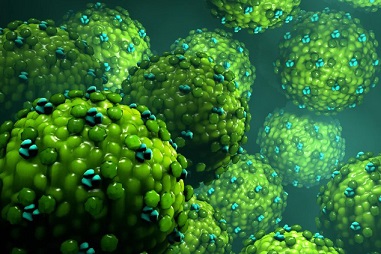South Korean Study Highlights STING Agonists as Potential Game Changers in Combating Influenza Viruses
Nikhil Prasad Fact checked by:Thailand Medical News Team May 28, 2024 10 months, 4 weeks, 1 day, 17 hours, 19 minutes ago
Influenza News: The COVID-19 pandemic underscored the critical need for effective strategies to combat respiratory diseases. Researchers in South Korea are now focusing on an innovative approach: utilizing STING agonists to fight influenza viruses. This
Influenza News report covers their timely study findings as the world is facing an imminent H5N1 outbreak. Stimulator of interferon genes (STING) plays a crucial role in the body's innate defense mechanisms against respiratory infections. While its importance in defending against DNA viruses is well-established, new evidence suggests STING also plays a key role in combating RNA viruses, including influenza.
 STING Agonists as Potential Game Changers in Combating Influenza Viruses
The Role of STING in Viral Defense
STING Agonists as Potential Game Changers in Combating Influenza Viruses
The Role of STING in Viral Defense
STING, located in the endoplasmic reticulum of cells, activates the body's immune response upon detecting microbial infections. When STING binds to its cyclic dinucleotide ligands, it triggers a cascade of immune responses, including the activation of TANK-binding kinase 1 (TBK1) and the production of interferons (IFNs) and interferon-stimulated genes (ISGs). These molecules are essential in mounting an effective antiviral response. Additionally, STING activation can induce autophagy, a process that helps restrict viral replication.
Exploring STING Agonists
Researchers at Korea University Guro Hospital and Korea University College of Medicine have conducted a study to explore the efficacy of STING agonists against various strains of the influenza virus (IFV). The study utilized a synthetic small molecule, dimeric amidobenzimidazole (diABZI), known for its potent antiviral effects against multiple respiratory viruses, including SARS-CoV-2. The research focused on evaluating diABZI's effectiveness in both human and mouse macrophages and primary nasal epithelial cell cultures.
Promising Results in Laboratory Studies
In laboratory experiments, the researchers found that diABZI exhibited substantial anti-IFV activity. The study showed that diABZI significantly reduced viral replication in mouse bone marrow-derived macrophages (BMDMs) and human THP-1 macrophages. The treatment with diABZI led to increased expression of antiviral genes and suppressed the production of viral proteins. These effects were observed across multiple strains of IFV, including A/H1N1, A/H3N2, B/Yamagata, and B/Victoria.
Human Nasal Epithelial Cell Cultures
To further validate their findings, the researchers tested the antiviral effects of diABZI in primary air-liquid interface (ALI) cultures of human nasal epithelial cells. These cultures mimic the natural environment of the human respiratory tract. The results were promising: diABZI significantly suppressed viral titers and improved cell viability. The treatment also enhanced the barrier integrity of the nasal tissues, suggesting that STING agonists could help maintain tissue health during viral infections.
The Downside: Potential Infla
mmation
While the study highlighted the potential of STING agonists in combating IFV, it also noted a downside. The activation of STING leads to the production of pro-inflammatory cytokines, which, while essential for fighting infections, could potentially cause inflammation if not properly regulated. This finding indicates that future therapies involving STING agonists will need to carefully balance antiviral efficacy with the risk of excessive inflammation.
STING Agonists vs. Traditional Antivirals
One of the significant advantages of STING agonists over traditional antiviral therapies, such as recombinant IFN, is their stability and lower cost. STING agonists like diABZI can be stored at room temperature and may be effective at lower doses. This makes them a potentially more practical option for widespread use, especially in resource-limited settings.
Future Directions
The researchers suggest that further studies are needed to fully understand the mechanisms by which STING agonists exert their antiviral effects. Specifically, the role of STING-mediated autophagy in controlling viral replication needs to be explored. Additionally, optimizing the delivery of STING agonists to target tissues while minimizing inflammatory side effects will be crucial for developing effective therapies.
Conclusion
The study conducted by South Korean researchers highlights the potential of STING agonists as promising therapeutic agents against influenza viruses. These findings open up new avenues for developing antiviral therapies that can effectively combat respiratory pathogens. As researchers continue to explore and refine these treatments, STING agonists may soon become a vital tool in the global fight against influenza and other respiratory viruses.
The study findings were published in the peer reviewed journal: Viruses.
https://www.mdpi.com/1999-4915/16/6/855
For the latest
Influenza News, keep on logging to Thailand Medical News.
Read Also:
https://www.thailandmedical.news/news/swiss-study-finds-that-influenza-a-viruses-exploit-transferrin-receptor-recycling-for-entry-into-host-cells
https://www.thailandmedical.news/news/immune-evasive-proline-283-substitution-in-influenza-nucleoprotein-shows-that-the-virus-is-evolving-to-hijack-host-chaperones
https://www.thailandmedical.news/news/breaking-h5n1-strains-emerging-in-cows-possess-new-mutation-na-t438i-associated-with-reduced-susceptibility-to-neuraminidase-inhibitors
